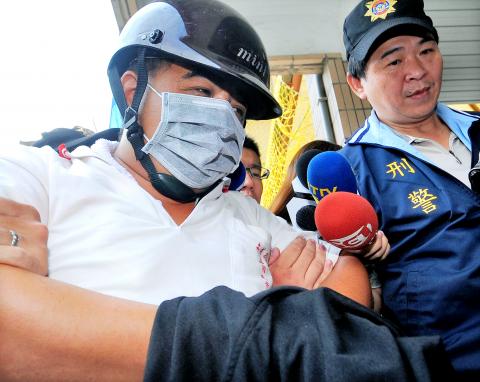The “White Rose” movement yesterday accused the government of arresting and jailing people only after public protests force it to do so, comments that came in the wake of the arrest of a taxi driver suspected of sexually assaulting a Japanese exchange student last week.
Hsieh Tung-hsien (謝東憲) was charged with rape and fled his apartment after being released on bail last week. Police arrested him near a cemetery in Tucheng District (土城), New Taipei City (新北市), at 11am yesterday, where he was allegedly waiting for a friend he had contacted to lend him money for his escape.
Hsieh was ordered detained at 2pm by the Banciao District Court.

Photo: Wang Min-wei, Taipei Times
Investigators said the exchange student was allegedly raped on Monday last week by Hsieh, who had offered her a ride after she got lost looking for her boyfriend’s apartment in a remote area of Tucheng District.
Police arrested him the next day and he admitted to having sex with the woman, but denied the rape charge, saying it was a one-night stand.
Despite his arrest on charges of sexual assault, Banciao District Court judge Lu Chun-chieh (盧軍傑) on Wednesday ordered Hsieh released on NT$50,000 bail, sparking outrage among netizens, who started a “Petition for the dismissal of the judge [who approved the bail]” on Facebook, which garnered more than 180,000 online fans.
While the Banciao District Prosecutors’ Office successfully appealed his release with the Taiwan High Court on Friday, Hsieh had by that time jumped bail and police were unable to locate him until yesterday.
Eva, the spokeswoman for the White Rose movement, an organization created in August last year after several cases of child molestation resulted in judgements that were largely seen as slaps on the wrist, said that as many as 74 people across Taiwan were high-risk repeat sexual offenders, with 200 more who were considered at medium-to-high risk of committing rape.
However, the government refuses to release information about those potential threats to society, which puts women at unnecessary risk, Eva said, adding that the White Rose movement would take to the streets at the end of this month.
The rally will take place on July 31 in front of the Presidential Office on Ketagalan Boulevard, she said.
The date coincides with the opening of the gates of the dead, the beginning of “Ghost Month” according to the lunar calendar, Eva said.
Some netizens said the “good brothers and sisters [ghosts]” would also take to the streets in protest and eliminate the “bad ghosts” that might again commit rape.
“How long must we wait before the government takes this problem seriously?” Eva asked, adding that although the public always made clear their anger at the erroneous judgements of so-called “dinosaur judges,” a similar event would likely happen again somewhere down the line.
WITH TRANSLATION BY JAKE CHUNG, STAFF WRITER

CHAOS: Iranians took to the streets playing celebratory music after reports of Khamenei’s death on Saturday, while mourners also gathered in Tehran yesterday Iranian Supreme Leader Ayatollah Ali Khamenei was killed in a major attack on Iran launched by Israel and the US, throwing the future of the Islamic republic into doubt and raising the risk of regional instability. Iranian state television and the state-run IRNA news agency announced the 86-year-old’s death early yesterday. US President Donald Trump said it gave Iranians their “greatest chance” to “take back” their country. The announcements came after a joint US and Israeli aerial bombardment that targeted Iranian military and governmental sites. Trump said the “heavy and pinpoint bombing” would continue through the week or as long

TRUST: The KMT said it respected the US’ timing and considerations, and hoped it would continue to honor its commitments to helping Taiwan bolster its defenses and deterrence US President Donald Trump is delaying a multibillion-dollar arms sale to Taiwan to ensure his visit to Beijing is successful, a New York Times report said. The weapons sales package has stalled in the US Department of State, the report said, citing US officials it did not identify. The White House has told agencies not to push forward ahead of Trump’s meeting with Chinese President Xi Jinping (習近平), it said. The two last month held a phone call to discuss trade and geopolitical flashpoints ahead of the summit. Xi raised the Taiwan issue and urged the US to handle arms sales to

State-run CPC Corp, Taiwan (CPC, 台灣中油) yesterday said that it had confirmed on Saturday night with its liquefied natural gas (LNG) and crude oil suppliers that shipments are proceeding as scheduled and that domestic supplies remain unaffected. The CPC yesterday announced the gasoline and diesel prices will rise by NT$0.2 and NT$0.4 per liter, respectively, starting Monday, citing Middle East tensions and blizzards in the eastern United States. CPC also iterated it has been reducing the proportion of crude oil imports from the Middle East and diversifying its supply sources in the past few years in response to geopolitical risks, expanding

Pro-democracy media tycoon Jimmy Lai’s (黎智英) fraud conviction and prison sentence were yesterday overturned by a Hong Kong court, in a surprise legal decision that comes soon after Lai was jailed for 20 years on a separate national security charge. Judges Jeremy Poon (潘兆初), Anthea Pang (彭寶琴) and Derek Pang (彭偉昌) said in the judgement that they allowed the appeal from Lai, and another defendant in the case, to proceed, as a lower court judge had “erred.” “The Court of Appeal gave them leave to appeal against their conviction, allowed their appeals, quashed the convictions and set aside the sentences,” the judges